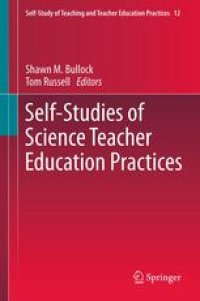
Ebook: Self-Studies of Science Teacher Education Practices
- Tags: Teaching and Teacher Education, Science Education, Learning & Instruction
- Series: Self-Study of Teaching and Teacher Education Practices 12
- Year: 2012
- Publisher: Springer Netherlands
- Edition: 1
- Language: English
- pdf
Part of a vital Springer series on self-study practices in teaching and teacher education, this collection offers a range of contributions to the topic that embody the reflections of science teacher educators who have applied self-study methodology to their own professional development. The material recognizes the paradox that lies between classroom science and the education of science teachers: the disciplines of science are often perceived as a quest for right answers, an unintentional by-product of the classroom focus on right answers in student assessment in science. In contrast, the profession of teaching has few right answers and frequently involves the management of conflicting tensions. A dilemma thus arises in science teacher education of how to shift perspectives among student teachers from reductionist to more inclusive attitudes that are open to the mercurial realities of teaching.
The self-studies presented here are unique, fresh and stimulating. They include the input of a beginning science teacher as well as science teacher educators from a range of backgrounds and varying levels of experience. In addition, the volume presents a truly international perspective on the issues, with authors hailing from five countries. Providing analysis at the leading edge of education theory, this collection will make fascinating reading for those teaching science—as well as those teaching science teachers.
Part of a vital Springer series on self-study practices in teaching and teacher education, this collection offers a range of contributions to the topic that embody the reflections of science teacher educators who have applied self-study methodology to their own professional development. The material recognizes the paradox that lies between classroom science and the education of science teachers: the disciplines of science are often perceived as a quest for right answers, an unintentional by-product of the classroom focus on right answers in student assessment in science. In contrast, the profession of teaching has few right answers and frequently involves the management of conflicting tensions. A dilemma thus arises in science teacher education of how to shift perspectives among student teachers from reductionist to more inclusive attitudes that are open to the mercurial realities of teaching.
The self-studies presented here are unique, fresh and stimulating. They include the input of a beginning science teacher as well as science teacher educators from a range of backgrounds and varying levels of experience. In addition, the volume presents a truly international perspective on the issues, with authors hailing from five countries. Providing analysis at the leading edge of education theory, this collection will make fascinating reading for those teaching science—as well as those teaching science teachers.